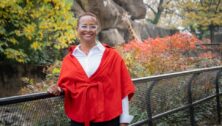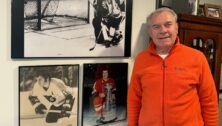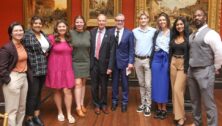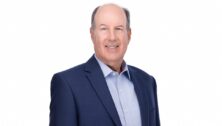Bucks County Leadership: Courtney Kelly, Executive Director of Admission, Widener University
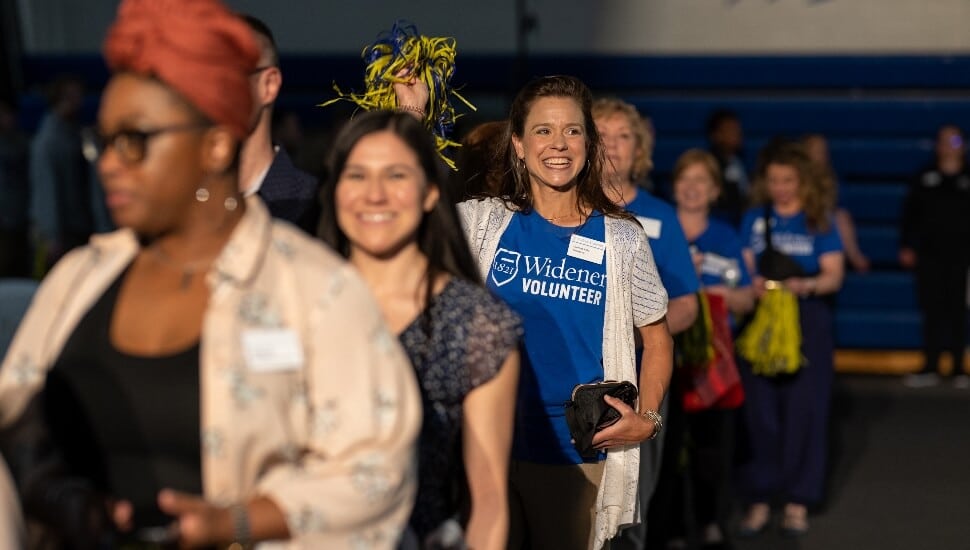

Courtney Kelly, executive director of admission at Widener University, spoke to BUCKSCO Today about growing up in Hollidaysburg, Pennsylvania. She stayed active in sports and music and enjoyed small-town life, but her family also dealt with hardship when her dad was diagnosed with brain cancer when she was a teenager.
Kelly discussed how she came from a long line of educators, so going into college admissions was an easy career choice. She’s spent nearly 20 years at Widener University, helping students find a sense of belonging and welcoming the largest-ever first-year class this year.
Where were you born and where did you grow up?
I was born in a small town in central Pennsylvania called Hollidaysburg right outside of Altoona. Growing up, there was a small-town feel, full of family and friends.
What did your parents do?
I come from a long line of educators. My parents were both teachers for over 30 years. My grandfather was everything in the Hollidaysburg School District – he drove a bus, taught, was a principal, and was also on the school board. My aunts and uncles were also teachers.
When I went to college, people asked, “Well, what are you going to major in?” The answer was education, which is what I knew. I grew up in a classroom. But, I fell in love with my communications classes and changed my major. Ultimately landing in college admissions and higher education is a natural combination of my major and my family background.
Where were you in the pecking order in your family?
I was one of two girls. My sister’s two years older than me. We’re very close – she’s very much my role model. I always aspired to be like her, her strength inspires me.
What do you remember about growing up in Hollidaysburg?
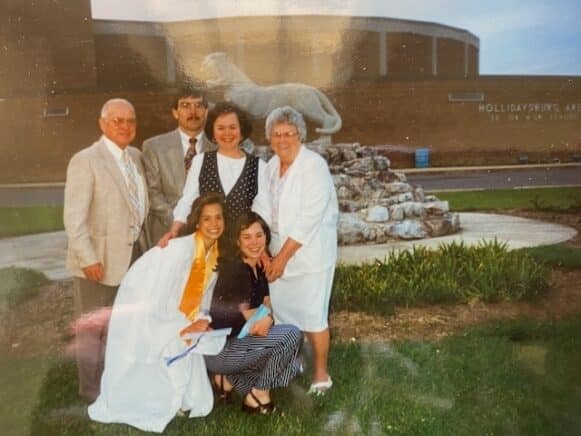
As I said, the core was family and friends. But when it comes to thinking back on my growing-up years, I segment them as before my dad got sick and after my dad got sick.
When I was 13 and he was 43, he had a grand mal seizure, very unexpected. It turned out he had a brain tumor. He lived for 15 years. My dad was a daily inspiration. He went through all the types of treatments.
So, I remember his strength and how our family had this sense of hope. When I looked at him, I didn’t know he was sick. We knew that he was living with this tumor, but he just picked up every day and cared more about others than himself. He kept teaching and coaching. Perseverance was a word that we used a lot.
So, what kind of part-time jobs did you have growing up?
In my small town, there was a miniature golf and ice cream place near me. I worked at the miniature golf course. I loved every second. I realized how much I love being around people.
What lessons did you take from that experience still guide you today?
It’s all about connecting with people and customer service, communicating with people, meeting them where they’re at. Fortunately, miniature golf is a fun thing. People are there to have fun. You might get a disgruntled person every now and again. But you find a way to connect and talk and just be there for the person.
My kids, husband, and I do a lot of miniature golfing. Everywhere we go – we just came back from a trip to the Florida Keys, and we found a miniature golf course there. But we think Delaware County doesn’t have enough miniature golf courses. We live in Wallingford, but we’re real close to the Media line. I joke that my dream is to open a miniature golf course in Media.
What about sports? Did you play sports in high school?
I love being active. My dad was a coach, so sports were a big part of our growing up. I dabbled in a lot. I wouldn’t say I stood out in any, but I ran track, I played softball, basketball, I was a cheerleader.
I remember getting the Hustle Award once. I was so excited about it. It wasn’t like best shooter or any of those other accolades. I think it goes back to the hard work and perseverance that I grew up with. I wasn’t breaking any records, but I think I was a solid team member. I got a team dedication award once, which also meant a lot to me.
Did you have a favorite sport, Courtney?
I loved running track. I ran the hurdles. And I was part of the four-by-one relay. I liked that track had the combination of the individual part and the team. I loved softball, too. My dad would coach my team in the summer.
What about music? For most people growing up, music plays a key part in their life.
I played the piano and started lessons early on. Playing the piano was a real outlet for me – still is, when I can find some time. When I really need to connect to myself, I sit down with the piano. In junior high and high school, I was part of the chorus and played the clarinet in the orchestra and the band. So, performing music played a really big part of my life.
As for music I listened to, in late high school and early college, I loved Sarah McLachlan. It was when the Women in Music movement and the Lilith Fair began.
I also got into country music. One would think when you grew up in the area I did, I would have already liked country. But no, I became a pop country fan – Faith Hill, Kenny Chesney. I loved the Dixie Chicks when they first came out.
Did you have a favorite artist?
Kenny Chesney stands out from his high-energy concerts, but it’s hard because I love all music.
Where did you end up going to college?
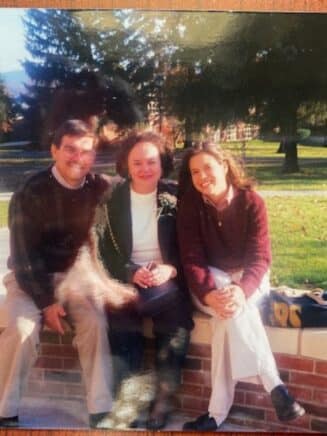
I chose Susquehanna University. It was also in a small town in central-ish Pennsylvania, about two hours from home. I wasn’t quite ready to make a huge leap. I knew I wanted to leave Hollidaysburg, because we’re close to Penn State, so a lot of people stay pretty local. I wanted to start spreading my wings. I knew I wasn’t ready for a more urban environment.
The funny part is that when I was done with college, I was like, “Okay, now I’m really going to try something.” To go from Susquehanna to LaSalle as an admission counselor after graduation was a huge culture shock but the best decision I ever made.
But Susquehanna was so right for me at the time because I thought I would flourish more in a small school, and the distance from home was right. I got the right feeling every time I was there.
In the work I do now, I talk with families about how this decision can be overwhelming. There are so many great options, but don’t underestimate your gut. Where do you feel you can be your best self? You’ve got to visit, walk around, and take a moment to do a self-check. And Susquehanna was right for me.
So, Courtney, looking back, was Susquehanna a good choice for you?
Absolutely. I gained the confidence I needed there. I learned so much more about myself. It was close – a car ride, not a plane ride. I lived with this feeling all along that my dad could turn the corner any day, so I wanted to be close enough to home for that.
But I could also be Courtney without any of that. That’s important for everybody because there are certain parts of yourself you want to expand on and parts that you want to explore.
After graduation, Courtney, who saw promise in you?
The very first was the director at LaSalle at the time.
What did he see in you?
I like to think he saw the energy and enthusiasm that this work needs, coupled with perseverance, work ethic, and just a drive to be my best self every day. I think when you’re communicating with this age group, you need a certain maturity, a little separation. I graduated in 2000, and I started my job a month after graduation. So, I think it was that trust and maturity, and, coupled with that, energy and enthusiasm and hard work.
Who else saw promise in you?
Widener’s leadership, collectively through the years; they’ve been extremely supportive of me. I’ve held a few positions at Widener, but my first position was thanks to a colleague I met at West Chester University, where I worked after LaSalle. That’s where I met my mentor, Ed Wright, who was in admissions there, and then came to Widener to lead the admissions team. I was really interested in earning my master’s degree at the time. He had an opening, and Widener had a graduate program. I started at Widener in September of 2005. There was so much about Widener that reminded me of Susquehanna that it felt like the right fit for me.
You’ve been there for almost 20 years now, right?
Nineteen years. People often say, “Why do you stay?” It’s just such a special place, and in the work I do, it means a great deal to me to show that. Sometimes a prospective family is only here for two hours. How do you show the essence and the heart of a community and a university in that amount of time? I had a visiting dad pull me aside one time, and he said, “This is the real deal. What’s happening here is what we want for our children.”
I think President Stacey Robertson, her leadership and the way she’s committed to a sense of belonging are part of the magic right now.
We’re at the beginning of 2024. What are your priorities this year?
That sense of belonging. We have students coming out of a traumatic experience in the pandemic with a variety of experiences. We know that mental health, emotional health, is so prevalent and important – to parents, too. They’re wondering, “How do I know that a community’s going to have my student’s back?”
Widener’s that kind of place that has a student’s back. You belong. Again, President Robertson is making it such a transparent part of her leadership, and it’s catching on like wildfire.
That’s really cool. What else?
I want students to know they belong here, and that they can do it all. Widener’s big enough and small enough at the same time. It’s big enough that it offers a wide range of options both in and outside the classroom. And you’ve got Philadelphia around the corner. But it’s small enough that you can make it your own.
What are you doing this year that’s different? What’s 2024 going to look like for you?
I’m super proud to say that we enrolled our largest first-year class ever this past fall, thanks to the commitment of the entire campus community. They’re in their first year. The energy is so amazing.
The monkey wrench in all of this – and in the industry, so we’re not alone in this – is that there’s huge disruptions to the financial aid timeline and the FAFSA form. Every school is navigating this, but it’s a major disruption because understanding your financial commitment is obviously a huge part of making a college decision.
Typically, at this time of year, we would have been sending out financial aid offers for two months. Right now, we – colleges and universities collectively – are not even sure when we’re even going to get the financial aid information from the federal government to be able to develop the financial aid offers. The later offers go out, the less time students have to decide.
May 1 is National Decision Day but Widener has suspended that traditional deadline for full-time, first-time undergraduate students, because asking students to make a life-changing decision with only a few short weeks or days of notice is not reasonable. Student well-being is central to Widener’s culture of belonging and we don’t want our deadline to add anxiety to an already stressful process.
What do you do with your free time, Courtney?
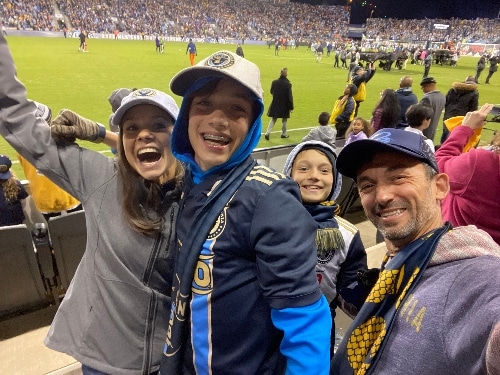
I sometimes say that if I’m not working, I’m either driving to a soccer field or at a soccer game. My two sons play competitive soccer – they love it – and my husband coaches soccer. I love watching and cheering because, again, I love sports – and the three of them are my world. We go watch the Union play a lot – we have season tickets. And, at this stage in my life, the way I want to spend my free time is being with them – being a present and supportive mom and wife, just like they support me.
I have three last questions for you. What’s something big you’ve changed your mind about over the last 10 years?
I think many of us strive, myself included, to be ‘perfect.’ And there is no ‘perfect.’ I hope others feel that, too. I’ve come to be more accepting of myself, and my husband has been my driving force and encouragement in this. I think social media has made this a real hard issue. You’re only seeing the best of everyone on social media. We all need to try to understand that this is not real. It’s not the everyday. We have to accept, broadly, all of the pieces of us.
But you’ve had to go easy and give yourself some grace, too, because you drive yourself pretty hard.
Giving yourself grace is a huge part of accepting yourself. I still struggle with that every day. I hope I can instill that in others. Part of President Robertson’s inauguration speech was about this. It’s okay to fail. It’s okay to learn and give yourself grace.
It’s a crazy world out there. What keeps you hopeful and optimistic?
My experience with my dad’s sickness and what my sister, mom, and I learned from it – there are tough days, and you may get dealt a hard deck, but there’s always something right. My dad wrote something to us once – I forget exactly how he phrased it, but essentially, there’s good in every day. Some days you just have to look harder to find it.
I don’t want it to sound as if I don’t have bad days, because I sure do! But I focus on knowing there’s always something good. As hard as it was to lose my dad, there was a lot of hope in that time period, and there still is.
Finally, Courtney, what’s the best advice you ever received?
It was the minister in our church, and it was right after my dad had had that seizure, so I was 13 years old. We weren’t sure what was happening. He was still in a coma, and I think she was at a loss for words. She said, and I think it was something she had read on a card, “When you feel at the end of your rope, just tie a knot and hold on tight.”
My grandmother was there, my dad’s mom, and she had a handkerchief, as most grandmothers in the ‘80s would have. She gave it to my sister and I, and she put a knot in it. Especially for that first time period, we just walked around with that handkerchief in our pockets. I think of that often – you’re going to get to the end of your rope, and sometimes I feel like I’m there for a while, but you just hold on to that knot.
Connect With Your Community
Subscribe for stories that matter!
"*" indicates required fields


























